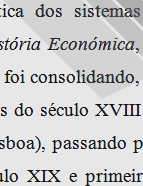

................................
Economic history has its origins in two disciplines: economics and history (Franklin Mendels, "Économie. Histoire économique", 1986, p. 215). The process leading to its autonomy as regards general history – which prevailed until the late 18th century – was subject to a number of phases. Initially, attention was drawn to the relevance of economic facts within the general historiographical context, which later became the subject of research. This occurred in diverse political and cultural environments, within the scope of the Enlightenment and the physiocratic policies of the late 1700s, as well as within the context of liberalism and the development of capitalism thereafter. At the turn of the 19th to the 20th century, economic history disciplines were established in several foreign universities, indicating a degree of maturity of this new field of research: Harvard (the first discipline of economic history in the Anglo-Saxon world, in 1893); Manchester (1910); Cambridge (1928); Oxford (1931); and the London School of Economics, in London (1931). At the Collège de France, Pierre-Émile Levasseur (1828-1911) held the chair of Histoire des doctrines économiques from 1871 to 1911 (Id., Idem, pp. 216-217). Journals dedicated to the subject were published, along with historical studies on various aspects of the economy and economic development. From the creation of the journal Annales d’Histoire Économique et Sociale in Strasbourg (1929) and the Journal of Economic History in the United States (1941), economic history – often linked to social history, particularly in France – underwent significant development. It became a prominent subject of research within the schools of new history and new economic history. Thanks to works by key authors published in the 1930s (such as Simon S. Kuznets, François Simiand, C. Ernest Labrousse, and Earl J. Hamilton), "a new economic history, fundamentally statistical, was born". As has been highlighted, "economic history is essentially the political economy of evolving systems or structures" (V. Magalhães Godinho, Introdução à História Económica, 1970, pp. 51-53). In Portugal, this new research area also became consolidated, albeit slowly and with some time lag, from the late 18th century onwards (mainly due to the significant efforts of the Lisbon Academy of Sciences), through research and the publication of works in the second half of the 19th century and the early 20th century. This process intensified through the activities of distinguished authors—not only trained historians but also economists, engineers, and jurists—after World War II and even more notably following the transformations that occurred after the 25th of April 1974. Regarding the evolution of economic history in the contemporary period, there are already some syntheses by authors such as Vitorino Magalhães Godinho (1971), Joel Serrão (1971), Álvaro Ferreira da Silva (1999), João Paulo Avelãs Nunes (1995), Luís Miguel Duarte (undated), and José Amado Mendes (1994; 1996).
